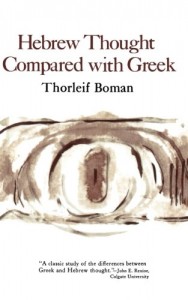Bells Rung Simultaneously
 I’ve been reading through a book called Hebrew Thought Compared with Greek. Not likely to become a best-seller anytime soon but this book is loaded with interesting perspective. This is particularly interesting for a Christian since the Old Testament is written in Hebrew and the New Testament is written in Greek. One of the passages that stood out to me comes from John 1. The first three verses begin by explaining Jesus.
I’ve been reading through a book called Hebrew Thought Compared with Greek. Not likely to become a best-seller anytime soon but this book is loaded with interesting perspective. This is particularly interesting for a Christian since the Old Testament is written in Hebrew and the New Testament is written in Greek. One of the passages that stood out to me comes from John 1. The first three verses begin by explaining Jesus.
“In the beginning was the Word, and the Word was with God, and the Word was God. He was with God in the beginning. Through him all things were made; without him nothing was made that has been made.”
In the Hebrew thought “word” is “deed.” As the book unpacks it: “‘Word’ and ‘deed’ are thus not two different meanings… but the ‘deed’ is the consequence of the basic meaning…” In the Greek thought “word” is “meaning.” As the book unpacks it: “The deepest level of meaning in the term ‘word’ is thus nothing which has to do with the function of speaking… but the meaning, the ordered and reasonable content.” If we consider both the Hebrew and Greek understanding of this idea we find that Jesus is literally the deed of God and the ultimate meaning of God’s intent. Words have meaning, and this one especially so. This word shows us God Himself. I love that it doesn’t matter what language or culture you pick between the two. Both expressions show us that in Jesus we see the fullness of God. If Jesus is the deed of God as the Hebrews understood it, then we can see the sort of things God does by looking at what Jesus did. What about all those things God gets accused of doing today? Doesn’t He ultimately cause pain and isn’t He responsible for evil? Reconsider these conclusions with God’s deeds being what we saw Jesus doing and see the true nature of God’s role today. If Jesus is the intent of God as the Greeks understood it, then we never have to wonder again what God is really like. What about all those crazy Old Testament stories? Reread them with God’s intent being Jesus and arrive at the deeper meaning. This leads to the conclusion in the book that:“When, therefore, the Fourth Evangelist pronounces the word logos at the beginning of his Gospel, the many different profound meanings… harmonize into a beautiful and mysterious unity for him as well as for his Greek-speaking readers familiar with the Old Testament in the same way as the sound of several church bells rung simultaneously.” Thorleif Boman
Do You Want to Read the Bible Without Falling Behind?
Sign up your email and I’ll send you a PDF to download and use my custom-made reading plan system. There’s no way to fall behind on this system and every day will be different no matter how long you use it!
I’ll send future content directly to your inbox AND you can dive into the Bible like never before.




